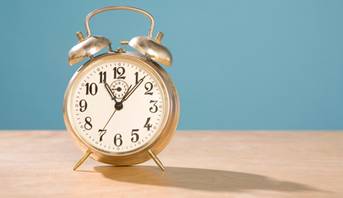How to game your body clock for weight-loss results
http://www.prevention.com/food/healthy-eating-tips/does-it-matter-when-you-eat
By Cindy Kuzma, posted on Prevention News
 When it comes to weight loss, calories count—but so does the clock. People who eat their biggest meal earlier drop more pounds even when they follow similar diets, according to new research in the International Journal of Obesity.
When it comes to weight loss, calories count—but so does the clock. People who eat their biggest meal earlier drop more pounds even when they follow similar diets, according to new research in the International Journal of Obesity.
Researchers studied 420 Spanish men and women participating in a 20-week weight loss program. The study protocol dictated their calorie count but not their meal timing. Half of them ate lunch—which accounts for about 40% of Spaniards’ daily intake—before 3 pm. The other half lunched later. The results: Delayed diners slimmed down more slowly and ended up shedding 9% of their body weight over the course of the study, compared with 11% for those who ate earlier. That’s about a 3.5-pound difference for people who started at 175.
Late eaters ate less breakfast or skipped it altogether, meaning many hours elapsed between full meals. So while they consumed the same amount of food throughout the day, their meals had a different effect because they were famished. In general, our bodies require nourishment every four to six hours or so; “if we go a long period of time without having eaten, the body will actually absorb at a greater rate when it does get food,” says nutritionist Nicolette Pace, MS, RD, of NutriSource Inc in Great Neck, NY.
Why? Your fat tissue seems to have its own internal clock, timed to match your need for nutrients and your typical eating habits, says study author Marta Garaulet, PhD, of the University of Murcia in Spain. If you don’t eat then, your body fat’s processing mechanisms may not function properly.
In the real world—where researchers aren’t monitoring every morsel—starving yourself early in the day also leaves you prone to binge. “Going without food for too long can lead to compensatory eating when hunger and cravings get out of control later,” says Jill Coleman, MS, clinical nutritionist and co-founder of Metabolic Effect. Excess calories at any hour pack on pounds, but stacking them late in the day could be even worse because you don’t have time to burn them off, Pace says. You’ll wake up still full and begin the whole harmful cycle all over again. (Click here for more tips to prevent binge eating.)
On the flip side, proper meal timing won’t magically erase your indulgences—that 800-calorie slab of cheesecake will widen your waistband regardless of whether you eat it at 10 am or 10 pm. But sync up with your body’s natural rhythms and you’ll likely find it easier to control your eating habits and your weight. Here’s how:
• Err on the early side. The results don’t mean you have to have your biggest meal at lunch instead of dinner (though it’s an option if you’d like to try it), Garaulet says. However, they do suggest there’s a benefit to consuming calories on the early side of the typical range. Since American dinner tends to fall between 6 and 10 pm, try scheduling supper before 8, she recommends.
• Use a satiety scale. Regularly rank your hunger from one to 10, where one means you’re famished and 10 stands for overstuffed. Eat when you reach three (you’re grumbly but not yet weak or irritable). When you reach seven—comfortably full—put down your fork, Pace says. This prevents you from becoming too hungry and then binging to compensate (as well as from overeating).
• Keep a food journal, complete with times. Logging when and not just what you eat will help you spot unhealthy patterns, such as skipping breakfast and pigging out in the evening, Pace notes. You’ll probably notice that if you don’t eat regularly—every three to six hours or so—you’re prone to overdo it afterward. (In fact, writing down what you eat is one of our 15 Small Changes for Big Weight-Loss Results.)
• Plan ahead. Once you’ve used a journal to pinpoint the hours you’re typically hungriest, aim to have access to healthy meals at those times. Choose foods high in protein and fiber, Coleman says: “You’ll feel fuller for longer.”
_ _ _ _ _ _ _ _ _ _ _ _ _ _
Paying attention to time when we eat is as important as knowing what to eat and how much to eat for us to stay healthy. Also knowing our eating habits should help us with our diet plans.
Read more:
http://www.prevention.com/food/healthy-eating-tips/does-it-matter-when-you-eat
